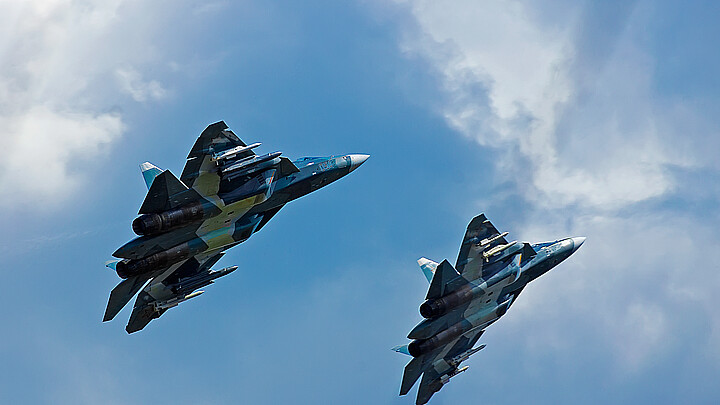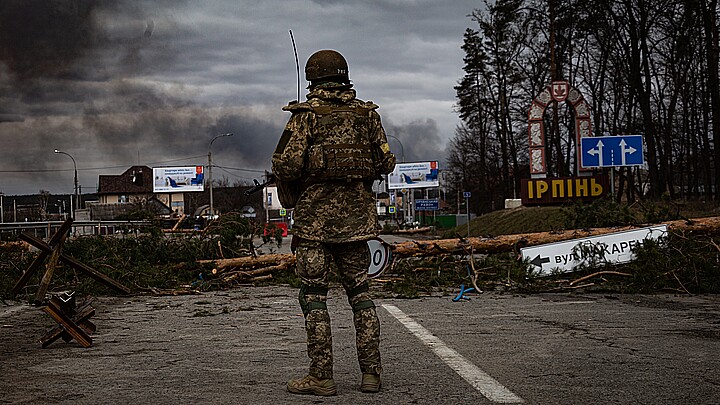Politics
SPECIAL REPORT: Russians flee homeland in fear of new Iron Curtain
Multiple reports suggest thousands of Russian citizens who disagree with Vladimir Putin’s invasion are scrambling to leave their homeland as sanctions close off travel options. One prominent Russian-Israeli oligarch who fled to Israel in 2003 after being targeted by Putin announced Tuesday he will renounce his Russian citizenship. “Everything that Putin touches dies,” he said.
March 11, 2022 7:52am
Updated: March 11, 2022 7:52am
Over 2 million Ukrainians refugees have fled their homeland as Russian forces continue their military action into the country. But Russian citizens who disagree with Vladimir Putin’s decision have also scrambling to get out of Russia as sanctions close off travel options.
Tens of thousands of people have escaped Russia in the face of increasingly severe measures imposed by the Kremlin to crush dissent, reports NBC News. That, combined with the enormous international sanctions against Moscow have revived fears a new “Iron Curtain” will once again isolate Russia from the rest of the world.
Aglaia, a 23-year-old student and activist, lived in St. Petersburg before flying to Armenia, one of the few places Russian flights are not banned. She asked not to be identified by her last name, as she fears reprisal by state security if she ever returns.
“We were very scared,” Aglaia told NBC News. “We just had this feeling of deep, deep sadness — but also mixed with anger.”
Younger liberals, like Aglaia, are alarmed at the severity of the regime’s crackdown on domestic dissent. Over 13,500 Russian citizens have been arrested for attending protests across the country, with video showing riot police beating demonstrators and handling them roughly.
“I am aware that I’m in a bubble of progressive, open-minded people, but some of the conversations you hear on the trains are unbelievable,” Aglaia said. “I heard someone say: ‘Oh, a dollar costs a lot again? Why does that matter if you don’t go to the U.S.?’”
Options for getting out have been restricted or slammed with demand. Almost all European airlines suspended flights between Russia and the rest of Europe over the last week in accordance with E.U. sanctions on Russian aircraft, leaving people like Aglaia scrambling over limited seats on the few remaining routes.
Others are getting to northern Europe on land, crossing into neighboring Finland by car, bus or train.
“It is pointless to remain. There is no future for us,” said Vyacheslav, a 59-year-old consultant arrived in Helsinki on a bullet train from St. Petersburg with his wife and daughter. Residents of the Finnish capital have been welcoming Russians with flowers and signs, reports The Washington Post.
Russians leaving the country also face uncertainty over their finances as the economy is rocked by sanctions and banks being cut off by international payment processors. Mastercard and Visa are suspending operations in Russia, and several Russian banks are being disconnected from the international SWIFT payment network, making it difficult for Russians to access their funds abroad.
“You just have to hope for the best. We each have higher education,” said Vyacheslav, who plans to stay with friends in Europe and dip into savings. “We will manage somehow.”
Russia’s Jewish community also has Israel as an option. Bloomberg reports that at least 1,400 Russians have had their visa applications approved, with Israel prepared to absorb as many as 100,000 Jews and their extended families from Russia and Ukraine.
Israel became a popular destination for wealthy Russian citizens trying to avoid U.S. sanctions on Russia following its annexation of the Crimean Peninsula in 2014. Many oligarchs obtained Israeli citizenship using an Israeli law that allows anyone with Jewish parents or grandparents to apply for citizenship.
Among these is Leonid Nevzlin, a prominent Russian-Israeli oligarch who fled to Israel in 2003 after being targeted by Putin’s government. He announced Tuesday that he will renounce Russian citizenship to protest the invasion of Ukraine, according to Haaretz.
“Everything that Putin touches dies,” Nevzlin wrote in a Facebook post. “Russian citizenship in itself has turned into a mark moral turpitude that I no longer want to carry… I am against the war. I am against the occupation. I am against the genocide of the Ukrainian people.”
Nevzlin added: “I was one of the first to be hit by Putin. He threw my friends in jails, and killed some of them. I have spent almost twenty years outside Russia, but that is exactly what has allowed me to see its process of rotting and decomposing.”
Russians and those from other former Soviet Union counties make up about a tenth of Israel’s population.
One of the signals stoking intense fears of isolation is coming from the Kremlin in the form of a media blackout.
On Friday, Putin’s United Russia regime made it illegal to promote so-called “fake news” which includes referencing the invasion of Ukraine as a “war,” a crime now punishable for up to 15 years in prison.
Since then, the BBC and CNN have stopped broadcasting and the The New York Times announced Tuesday it was withdrawing its operations from Moscow. The Russian investigative news website Agentsvo reports more than 150 Russian journalists have fled their homeland.
The Russian government also forced two of its last independent news networks, Echo Moscow and TV Rain, to stop broadcasting.








